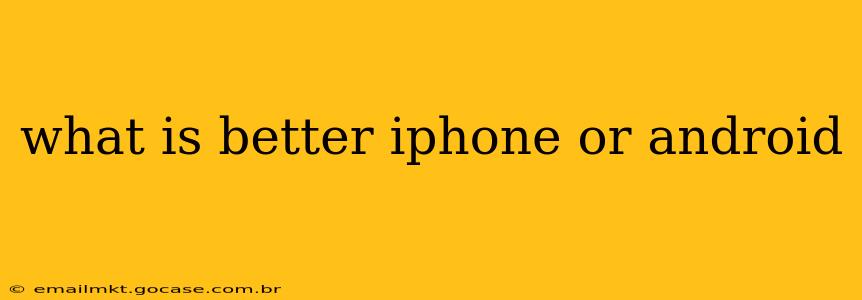iPhone vs. Android: Which Smartphone Reigns Supreme?
The age-old debate: iPhone or Android? Choosing between these two mobile operating systems is a deeply personal decision, hinging on individual priorities and preferences. There's no single "better" option; the ideal choice depends on your needs and lifestyle. This comprehensive comparison explores the key differences to help you make an informed decision.
What are the main differences between iPhones and Androids?
This is a fundamental question, and the answer lies in several key areas: operating system, app ecosystem, customization, price, and hardware. iPhones utilize Apple's iOS, known for its simplicity and user-friendliness. Android, on the other hand, is an open-source operating system developed by Google, offering greater flexibility and customization options but sometimes at the expense of a more streamlined user experience. App ecosystems also differ significantly. While both platforms offer millions of apps, there are some exclusives on each side. Android phones generally offer a wider range of price points, from budget-friendly options to high-end flagships, while iPhones tend to be positioned at the higher end of the market.
Which phone is better for gaming?
Both platforms offer robust gaming experiences. High-end iPhones and Android phones are equally capable of running demanding mobile games. However, Android's open nature allows for greater customization, potentially leading to optimized performance for specific devices. The choice here often boils down to specific game preferences and individual device capabilities. Consider factors like screen size, processing power, and battery life when evaluating gaming performance.
Which is better for security and privacy?
Both iOS and Android prioritize security, but their approaches differ. Apple's tightly controlled ecosystem and strong emphasis on privacy features have earned it a reputation for security. Android, due to its open-source nature and fragmentation across various manufacturers, can pose slightly greater security risks. However, Google regularly updates Android's security features, and many Android manufacturers implement robust security measures of their own. The level of security often depends on the specific device and its software updates.
Which OS is more user-friendly?
iOS is generally considered more user-friendly, particularly for those new to smartphones. Its intuitive interface and streamlined design make it easy to navigate and learn. Android offers more customization options, which can be both a boon and a bane. While this flexibility allows for personalized experiences, it can also lead to a steeper learning curve for less tech-savvy users. Ultimately, user-friendliness is subjective and depends on individual preferences.
Which phone has better camera quality?
Camera quality is a fiercely competitive area, and both iPhone and Android devices consistently produce excellent photos and videos. Top-tier models from both platforms often boast impressive features like multiple lenses, advanced image processing, and exceptional low-light performance. Ultimately, the "better" camera depends on factors like specific model, software optimization, and individual photographic preferences.
What is the cost difference between iPhone and Android?
Android phones offer a far broader range of price points. You can find budget-friendly Android smartphones for under $200, while high-end models rival the cost of iPhones. iPhones generally sit at the higher end of the price spectrum, offering premium features and build quality but at a premium cost.
Conclusion: Making the Right Choice
The "better" phone—iPhone or Android—depends entirely on your individual needs and preferences. Consider your budget, desired level of customization, preferred operating system aesthetics, and specific app requirements when making your decision. Weigh the pros and cons carefully, and choose the smartphone that best suits your lifestyle and technological preferences. Research specific models within each operating system to find the perfect fit.
